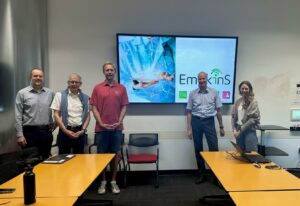Stanford University Mobilize Center
 EmpkinS and the Stanford University Mobilize Center are official “collaborative projects”!
EmpkinS and the Stanford University Mobilize Center are official “collaborative projects”!
The Mobilize Center is based at Stanford University and is a Biomedical Technology Resource Center (BTRC) funded through the NIH. The Mobilize Center was created with the vision of enabling the research community to use mobile technology, such as 2-D video and wearable sensors, and other large-scale datasets to quantify movement biomechanics, to extract insights about conditions that reduce mobility, and to advance precision rehabilitation. Building on its foundations as an NIH Big Data to Knowledge Center of Excellence, the Center’s innovative technologies will transform research and the diagnosis, monitoring, and treatment of mobility disorders.
Thereby, extensive two-way collaborative projects drive the development of their computational models and tools. These collaborations help to define specifications for tools and identify technological needs within the bioengineering, biomechanical modeling, data science, mHealth, and rehabilitation research communities.
We are proud to contribute to this outstanding community and look forward to our collaborative projects!